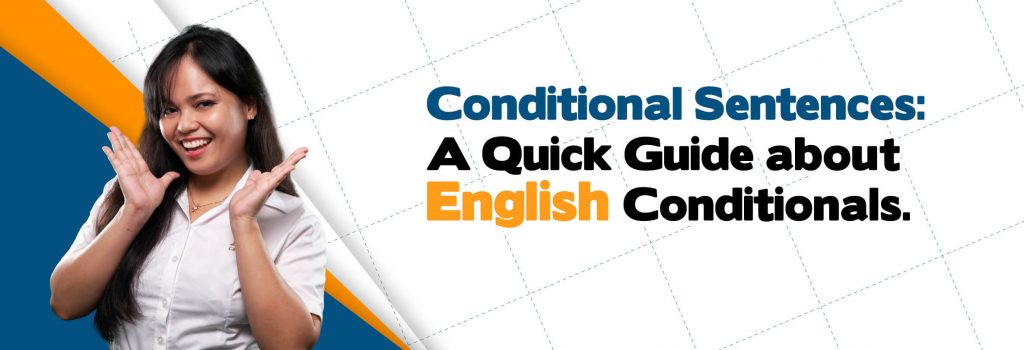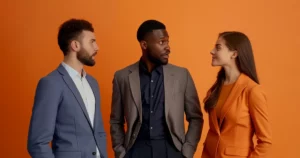
CONDITIONAL SENTENCES: A Quick Guide to Learning the Different Conditionals in English
What are the different conditional sentences in English?
Conditional Sentences also called conditional clauses or if clauses, are used to describe the result of something that might happen (in the present or future) or might have happened but didn’t (in the past). We make these sentences or clauses by using different English verb tenses.
In English, we classify conditionals sentences or clauses into two categories. Technically, what makes the two categories different is that the event described in the main clause depends on the condition described in the conditional clause.
The 2 categories that grammarians used to analyze conditionals are:
I. Real Conditionals
Grammatically, Real Conditionals are the type of conditional sentences that refer to things we think are true or likely. Moreover, this type also describes real-life situations, each of which is more realistic and is likely probable to happen.
The conditionals that belong to this category are:
(A) The Zero conditional
(B) The First conditional
II. Unreal conditionals
The next set we have is the Unreal Conditionals. In contrast, this type of conditional sentence refers to things we think are untrue or unlikely. Besides, we use them to describe unreal, imaginary situations or those which unlikely to happen. The conditionals belonging to this category are:
(C) The Second conditional
(D) The Third conditional
In order for us to learn what these conditionals are, let’s get started by learning it from the most real to the most unreal part first.
To begin with, let’s talk about the first type of real conditional sentence: the Zero Conditional.
Real Conditional sentences
The two categories that grammarians used to analyze conditionals are:
When do we use the Zero Conditional?
When we refer to the most probable and realistic condition, the zero conditional gets into the action. When referring to English sentences, this type of conditionals describes sentences that have the highest possibility to happen. To name some, we use this type of conditionals to describe scientific facts, habits and routines, and general truths. Additionally, the zero conditional is also used to describe rules and cause and effect.
As a present real conditional sentence, this type refers to ‘all time’, not just the present or future. They express a fact or situation that you normally do in real-life situations and is generally or always true, no matter what the time is.
Also, always remember that each type of conditional follows a very specific structure which can be found in either the first or second clause. This means that each of the “if clause” can be interchanged without changing the thought of the sentence.
In this type of condition, ‘if’ means ‘whenever’. This means, that there is a fixed connection between the two events.
The zero conditional follows the specific structure:
IF + PRESENT SIMPLE + PRESENT SIMPLE
PRESENT SIMPLE + if + PRESENT SIMPLE
Below are the situations in which we can use the zero conditional.
1. To express Scientific Facts
For example:
Wood doesn’t burn if there is no air.
If you heat water, it boils.
If you heat ice, it melts.
2. To talk about General Truths
For example:
You are not healthy if you smoke.
If you want to be healthy, you need to eat properly
If you earn more money, you pay higher taxes.
If it rains, the grass gets wet.
3. To talk about Habits and Routines.
For example:
If the weather is nice, she walks to work.
I read if there is nothing on TV.
If it’s my day off, I go to the park.
4. To talk about Rules
For example:
If there’s a yellow line on the road, don’t overtake.
If the blank is at the beginning of the sentence, choose a noun or a gerund. If you see a red light, then stop.
5. To show Cause and Effect
For example:
If you push the button, the volume increases.
If you press the button, the door opens.
If you eat too much, you’ll get fat.

Additional Rules when using the Zero Conditional sentences
A. Use of “WHEN” instead of “IF”
For example:
When is used to talk about events that are certain or very likely to happen
When it rains, the streets get wet.
When I have a day off from work, I often go to the beach. When I cook fish, the house always smells.
I always smoke when I drink.
When I go to the movies, I eat a bag of popcorn.
When it rains, it pours! [English proverb]
When I’m sad, I go shopping.
I listen to my iPod when I jog.
B. Use “UNLESS” instead of “IF NOT”
For example:
I can’t drive unless I have my glasses.
[I can’t drive if I don’t have my glasses.]
You can’t drive a car unless you have a license.
[You can’t drive a car if you don’t have a license.]
C. Use “IMPERATIVES” in the Main Clause
For example:
If you get lost, take a taxi.
If you can’t swim, attend swimming lessons.
If you cry, don’t come to me.
If you want to die, jump over a cliff.
If she gets on the train, take the bus.
D. Use of MODAL “SHOULD” instead of “IF”
For example:
Should you have any questions, please ask me after the lesson. If you have any questions, please ask me after the lesson.
E. You can also use MODAL VERBS in the Result Clause
For example:
I can’t drive if I don’t have my glasses.
If you want to go to university, you must study hard. If you want to lose weight, you should eat less and exercise more. You can’t drive a car if you don’t have a license.
F. You can use “IF” with different present continuous forms
For example:
If I am driving, I never answer my cell phone.
When I’m reading, my cat sits on my lap.
I listen to my iPod when I’m jogging.
Please don’t disturb me if I am sleeping!
The 1st Conditional
Another conditional sentence we have belonging under the real conditional category is the first conditional. Unlike the zero conditional, the first conditional expresses a thought that the action is possible or likely to occur.
Technically, even though this sentence structure is used to talk about the future, the condition clause [If I eat too much] uses the simple present tense.
Moreover, this type of conditional sentence also expresses a future possibility. We use this to talk about a result that is likely to happen or is almost certain to happen in the future if the condition in the If clause occurs.
The first conditional follows the specific structure that is:
IF + PRESENT SIMPLE + WILL+PRESENT SIMPLE
WILL+PRESENT SIMPLE + if + PRESENT SIMPLE
As mentioned above, this type of conditionals refers to an action that is likely to happen in the future. Having said, we use the first conditional to refer or talk about the following situations:
1. To talk about Possibilities
For example:
You’ll miss the train if you don’t hurry!
If I miss the train today, I’ll drive to work.
2. To talk about Superstitions
For example:
If you see a penny on the ground and pick it up, it will bring you good luck! If you break a mirror, you will have 7 years of bad luck!
3. To talk about Future Plans
For example:
If you’re going shopping today, I’ll come with you!
If you can get me a ticket, I’ll go to the concert with you!
4. To talk about Warnings and Threats
For example:
If you don’t come to my birthday party, I’ll never speak to you again. If you eat too much ice cream, you’ll make yourself sick!
Additional notes about the First Conditional Sentence
5. The 1st conditional sentence structure can also be used to talk about the future.
You can use conjunctions of time [when, before, after, as soon as, until] instead of if in the condition / dependent clause. They are always followed by the present simple tense.
Consider the following sample sentences:
-Before
For example:
I’ll finish this report before I leave tonight.
-After
For example:
I’ll eat dinner after I finish my homework
-Until
For example:
I’ll sit outside until it gets dark.
-As soon as
For example:
I’ll wash the dishes as soon as this TV show is over.
-When
For example:
I’ll wash the dishes when my TV show is over.
NB! When the present perfect is used with when it means that the event/action must happen before a future event/action occurs:
For example:
When I have saved enough money, I’ll buy a car!
When I have saved enough money, I’m going to buy a car!
Unreal Conditionals
Now that you already learned about the Real Conditionals, let’s move on to talk about the Unreal conditionals. These are the types of conditionals that describe situations that are unlikely, untrue, or impossible in the present or the past.
There are two types of conditional sentences or if clauses that belong to this category: the Second and Third conditionals.
The 2nd Conditional
In English grammar, we also refer to the Second conditional as the hypothetical conditionals. Why? This is because we use this type of conditional sentence to talk about situations or actions in the present or future which are not likely to happen or are imaginary, hypothetical, or impossible.
The Second conditional follows a specific sentence structure that is:
If + Simple Past + Modal + Base Verb
Modal + Base Verb + If + Simple Past
Moreso, we use this type of conditionals to express conditions in several situations, namely:
1. To talk about Impossible and Hypothetical Situations
For example:
If my grandmother was alive, I would invite her to my wedding.
N.B. If my grandmother IS alive… X! – you can’t use the 1st conditional for impossible situations.
If I were on the moon, I’d plant a coconut.
2. To give Advice
For example:
If you had dengue fever, I would recommend you to drink “mangagaw.”
N.B. This structure is often used to give advice: If I were you… – If you were me, what would you do? [asking for advice]
3. To talk about Unlikely situations
For example:
If I won the lottery, I would buy a mansion.
N.B. If I WIN the lottery … – you can use the 1st conditional instead to express a greater likelihood.
If I became a millionaire, I would travel around the world.
Additional Note about the Second Conditional Sentences
1. IMPLIED IF CLAUSES
For example:
What would I do without you? (“if you weren’t here”)
Where would I get one at this time of night? (“if I wanted one”) He wouldn’t agree. (“if I asked him”)
A. The ‘if clause’ can contain the PAST SIMPLE or the PAST CONTINUOUS.
For example:
If I was still working in Brighton, I would commute by train. If she were coming, she would be here by now.
If they were thinking of selling, I would want to buy.
A.1 A CONTINUOUS TENSE can be used in the IF CLAUSE…
For example:
If I were working now, I’d have more money.
If you were looking for a cheap computer, where would you shop?
A.2 … and in the RESULT CLAUSE!
For example:
If I had a better job, I wouldn’t be living with my parents.
We wouldn’t be doing this if we didn’t care about you!
—————————————————
B. The MAIN CLAUSE can contain ‘WOULD’, ‘COULD’ or ‘MIGHT’.
For example:
If I had the chance to do it again, I would do it differently.
If we met up for lunch, we could go to that new restaurant. If I spoke to him directly, I might be able to persuade him.
B.1 COULD (=ability) can be used in the If clause (= ‘were able to’)…
For example:
If I could go back in time and give myself advice, I’d tell myself not to worry so much about what other people think.
It would be great if you could help us paint the house this weekend! (= a polite way to ask for help)
B.2 …or in the result clause (= ‘would be able to’)!
For example:
If I had a map, I could easily find their house.
If we had more money, we could renovate the entire house.
***MIGHT be used in the result clause (= unlikely but possible)
For example:
If I learned how to swim, I might compete in a triathlon.
If I won the lottery, I might donate some of it to charity.
N. B. The choice between the first and the second conditional can often be a question of the speaker’s attitude rather than of facts. Compare these examples. Otto thinks these things are possible or (fairly) likely to happen, whereas Peter thinks either they aren’t possible or are (very) unlikely to happen.
Otto – If I win the lottery, I’ll buy a big house.
Peter – If I won the lottery, I’d buy a big house.
——–
Otto – If I get promoted, I’ll throw a big party.
Peter – If I got promoted, I’d throw a big party.
——–
Otto – If my team wins the Cup, I’ll buy champagne for everybody.
Peter – If my team won the Cup, I’d buy champagne for everybody.
The 3rd Conditional
Just like the second conditional, the third conditional sentence is used to express a hypothetical result to a past given situation. On a simpler note, this conditional is also used to talk about a past action that did not happen and its imaginary result in the past.
Grammatically, among all the types of conditional sentences, this type uses the past perfect tense after IF, then would plus the past participle.
Thus, the third conditional sentence strictly follows a structure like this:
If + past perfect, would/ could/might/ have + past participle.
Grammatically, the third conditional is used to imagine a different past.
For example:
If I had gone to the party, I would have seen him.
(I did not go to the party) (I did not see him)
Additionally, we can also use the third conditional in different situations, namely:
1. To talk about Criticism
For example:
– If you had driven more carefully, you wouldn’t have had an accident. If you saved your money, you could have bought a new computer.
2. To express REGRET about a decision
For example:
– If only I had followed my heart, I would have married her. If I had yes to the man I love, I would have lived with him with my three beautiful children.
Additional Note about the Third Conditional Sentences
1. IMPLIED ‘IF CLAUSE’
For example:
– I’d have done it. (“if you had asked me but you didn’t.”) – I wouldn’t have said that. (“if I’d been there.”)
– He wouldn’t have let him get away with that. (“if he had tried that with me.”)
Conditional Sentences: The Summary
There are four types of conditional sentences in English. Conditional Sentences also called conditional clauses or if clauses, are used to describe the result of something that might happen (in the present or future) or might have happened but didn’t (in the past). We make these sentences or clauses by using different English verb tenses.
We categorize the conditionals into two groups: Real and Unreal Conditionals.
Under the Real Conditionals refer to the Zero and First Conditionals.
The Zero Conditional structure is IF + PRESENT SIMPLE + PRESENT SIMPLE / PRESENT SIMPLE + if + PRESENT SIMPLE.
The First Conditional structure is IF + PRESENT SIMPLE + WILL+PRESENT SIMPLE / WILL+PRESENT SIMPLE + if + PRESENT SIMPLE.
On the other hand, we also have the Unreal Conditionals. The two conditionals under this category are the Second and Third Conditionals.
The Second Conditional structure is If + Simple Past + Modal + Base Verb / Modal + Base Verb + If + Simple Past.
Lastly, we have the Third Conditional. It has the structure of If + past perfect, would/ could/might/ have + past participle.



